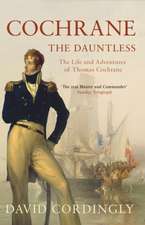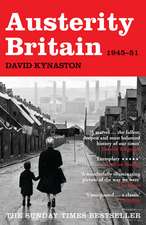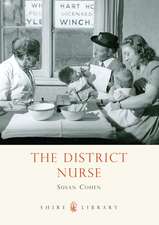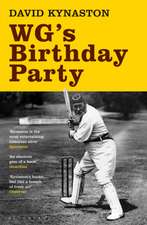Modernity Britain: 1957-1962
Autor David Kynastonen Limba Engleză Paperback – 22 apr 2015
Preț: 87.90 lei
Preț vechi: 123.44 lei
-29% Nou
Puncte Express: 132
Preț estimativ în valută:
16.82€ • 17.56$ • 13.92£
16.82€ • 17.56$ • 13.92£
Carte disponibilă
Livrare economică 14-28 martie
Livrare express 27 februarie-05 martie pentru 72.70 lei
Preluare comenzi: 021 569.72.76
Specificații
ISBN-13: 9781408844380
ISBN-10: 1408844389
Pagini: 880
Dimensiuni: 129 x 198 x 61 mm
Greutate: 0.66 kg
Editura: Bloomsbury Publishing
Colecția Bloomsbury Paperbacks
Locul publicării:London, United Kingdom
ISBN-10: 1408844389
Pagini: 880
Dimensiuni: 129 x 198 x 61 mm
Greutate: 0.66 kg
Editura: Bloomsbury Publishing
Colecția Bloomsbury Paperbacks
Locul publicării:London, United Kingdom
Caracteristici
David Kynaston is curator of Changing Britain 1945-2015 , a festival at the Southbank Centre that will in April and May 2015, inspired by his books, examine the last seven decades of British history.
Notă biografică
David Kynaston was born in Aldershot in 1951. He has been a professional historian since 1973 and has written eighteen books, including The City of London (1994-2001), a widely acclaimed four-volume history, and WG's Birthday Party, an account of the Gentleman v. Players match at Lord's in July 1898. He is the author of Austerity Britain 1945-51 and Family Britain 1951-57, the first two titles in a series of books covering the history of post-war Britain (1945-1979) under the collective title 'Tales of a New Jerusalem'. He is currently a visiting professor at Kingston University.
Recenzii
This superb history captures the birth pangs of modern Britain ... It is a part of Kynaston's huge achievement that such moments of insight and pleasure should accompany what has become a monumental history of our recent past
Richly detailed series . Indefatigable, judicious, with a magpie's eye for detail and a lovely grasp of tone and balance, David Kynaston is one of the great chroniclers of our modern story ... Every paragraph contains some glittering nugget
Triumphant ... A historian of peerless sensitivity and curiosity about the lives of individuals. His method is to immerse first himself, then his readers, in a deep quotidian fabric of the time, making every strand visible before gradually lifting his gaze and revealing the wider pattern
This compelling history of the nation is wise, funny, impeccably researched and beautifully written ... Not for one second does his writing sag under the weight of his research: if you asked him to plod, he simply wouldn't know how . This latest volume will be every bit as addictive as its predecessors . Like a great composer, Kynaston dots little melodies into the opening minutes which he later allows to swell into major themes . The best way to review this book would be to take a leaf from Lewis Carroll and map it all out, word for word. As it is, you'll just have to save me the effort by reading it for yourself
An exciting read, containing moments of suspense and lengthy sections of analysis . Kynaston's book makes salutary and urgent reading, suggesting that we might do well to live with half an eye on the Kynastons of the future
He is chewing his way through the giant lettuce-leaf of his chosen decades like a particularly thorough tortoise. Hares: watch out ... Kynaston is interested in getting the feel of life close up, and his range of sources is formidable
Masterful ... Kynaston has an enviable ability to see both the trees and the wood, and patterns start to appear ... Kynaston's project is already being acclaimed as one of the great achievements of modern history, and this fourth instalment, with its entrancing mix of entertainment, erudition and enlightenment, will enhance its status further
The latest volume of Kynaston's history of post-war Britain chronicles an era of tumultuous cultural, political, and commercial change - Harold Macmillan's 'never had it so good' years.
Richly detailed series . Indefatigable, judicious, with a magpie's eye for detail and a lovely grasp of tone and balance, David Kynaston is one of the great chroniclers of our modern story ... Every paragraph contains some glittering nugget
Triumphant ... A historian of peerless sensitivity and curiosity about the lives of individuals. His method is to immerse first himself, then his readers, in a deep quotidian fabric of the time, making every strand visible before gradually lifting his gaze and revealing the wider pattern
This compelling history of the nation is wise, funny, impeccably researched and beautifully written ... Not for one second does his writing sag under the weight of his research: if you asked him to plod, he simply wouldn't know how . This latest volume will be every bit as addictive as its predecessors . Like a great composer, Kynaston dots little melodies into the opening minutes which he later allows to swell into major themes . The best way to review this book would be to take a leaf from Lewis Carroll and map it all out, word for word. As it is, you'll just have to save me the effort by reading it for yourself
An exciting read, containing moments of suspense and lengthy sections of analysis . Kynaston's book makes salutary and urgent reading, suggesting that we might do well to live with half an eye on the Kynastons of the future
He is chewing his way through the giant lettuce-leaf of his chosen decades like a particularly thorough tortoise. Hares: watch out ... Kynaston is interested in getting the feel of life close up, and his range of sources is formidable
Masterful ... Kynaston has an enviable ability to see both the trees and the wood, and patterns start to appear ... Kynaston's project is already being acclaimed as one of the great achievements of modern history, and this fourth instalment, with its entrancing mix of entertainment, erudition and enlightenment, will enhance its status further
The latest volume of Kynaston's history of post-war Britain chronicles an era of tumultuous cultural, political, and commercial change - Harold Macmillan's 'never had it so good' years.









